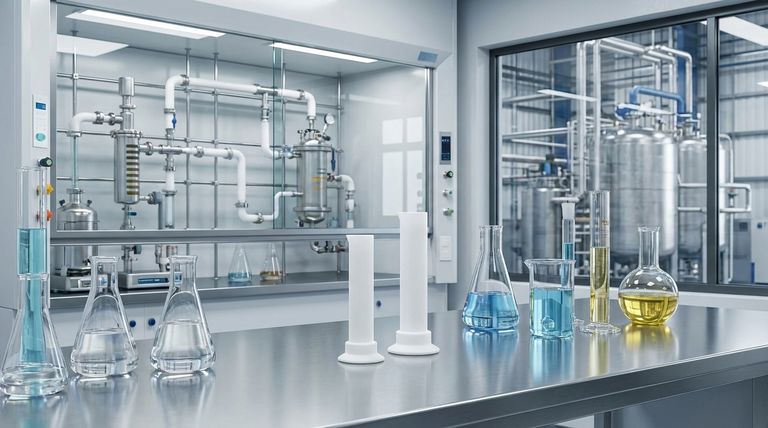At its core, Teflon's exceptional chemical resistance benefits any industry that handles corrosive, reactive, or high-purity substances. Key sectors include chemical processing, pharmaceuticals, laboratories, oil and gas, automotive, and semiconductor manufacturing. These industries rely on Teflon's inert nature to line pipes and tanks and to create durable seals and gaskets, ensuring both operational safety and product purity.
The true value of Teflon's chemical resistance is not just its durability, but its ability to enable process integrity. It provides a non-reactive barrier that protects equipment from corrosion, prevents contamination in sensitive products, and ensures the safe containment of hazardous materials.

The Principle of Chemical Inertness
Teflon, or Polytetrafluoroethylene (PTFE), is valued for a single, powerful characteristic: it is almost completely inert. This non-reactive quality is the foundation of its industrial utility.
What Makes Teflon So Resistant?
Teflon is renowned for its superior resistance to nearly all chemicals, including aggressive acids, bases, and organic solvents. Its molecular structure makes it non-reactive, meaning it will not degrade or corrode when exposed to harsh substances.
The Impact on Purity and Safety
This inertness has two critical consequences. First, it prevents contamination, which is non-negotiable in pharmaceuticals or laboratories. Second, it prevents equipment degradation, which is essential for safety in chemical plants where a leak could be catastrophic.
Key Industrial Applications Breakdown
The need to manage aggressive chemicals safely and cleanly is a common challenge across many high-stakes industries. Teflon provides a reliable and effective solution.
Chemical Processing and Oil & Gas
In these sectors, equipment is constantly exposed to corrosive materials. Teflon is used to line pipes, tanks, and vessels, creating an inert barrier that protects the structural metal from degradation. It is also used for gaskets and seals to prevent dangerous leaks.
Pharmaceuticals and Laboratories
Purity is the primary concern here. Teflon-coated equipment and membranes ensure that sensitive chemical reactions or pharmaceutical compounds are not contaminated by the containers holding them. This maintains the accuracy of experimental results and the integrity of the final product.
Semiconductor Manufacturing
The production of microchips involves extremely aggressive chemicals, including strong acids and solvents. Teflon encapsulated O-rings and other components are used to handle these fluids without breaking down or releasing impurities that could ruin a batch of semiconductors.
Automotive Sector
Vehicles rely on a variety of aggressive fluids, from fuel and oil to brake and transmission fluid. Teflon seals and hoses are used to ensure these systems remain contained and do not suffer from chemical degradation over time.
Understanding the Trade-offs
While its chemical resistance is nearly unmatched, it's important to understand Teflon's limitations to apply it correctly.
Mechanical Properties
Teflon is a relatively soft material. In applications requiring high structural strength or abrasion resistance, it is often used as a coating or liner rather than the primary structural component.
Temperature Limitations
While Teflon has a wide operating temperature range, it can degrade at very high temperatures. For extreme heat applications, other materials may be more suitable. Its properties can also change at cryogenic temperatures, which requires careful engineering consideration.
Making the Right Choice for Your Goal
Selecting Teflon is about matching its unique chemical inertness to a specific operational need.
- If your primary focus is handling highly corrosive chemicals: Teflon provides an essential, non-reactive barrier for pipes, tanks, and seals, preventing costly equipment degradation and enhancing safety.
- If your primary focus is maintaining absolute purity: Its inert surface is critical for laboratory, pharmaceutical, and semiconductor applications to avoid contamination of sensitive products and processes.
- If your primary focus is ensuring operational reliability: Teflon's durability in gaskets, seals, and hoses is vital for containing aggressive fluids safely in the automotive and chemical industries.
Ultimately, Teflon serves as a critical enabling material, allowing industries to perform complex, high-purity, and hazardous processes with confidence and safety.
Summary Table:
| Industry | Key Benefit of Teflon | Common Applications |
|---|---|---|
| Chemical Processing & Oil & Gas | Protects equipment from corrosive materials | Lining for pipes, tanks, vessels; gaskets and seals |
| Pharmaceuticals & Laboratories | Maintains absolute product and process purity | Coated equipment, membranes, labware |
| Semiconductor Manufacturing | Handles aggressive acids/solvents without contamination | Encapsulated O-rings, fluid handling components |
| Automotive Sector | Ensures reliable containment of aggressive fluids | Seals, hoses, gaskets in fuel, brake, and transmission systems |
Need reliable, chemically inert PTFE components for your application?
At KINTEK, we specialize in manufacturing high-precision PTFE components—including seals, liners, and custom labware—for the semiconductor, medical, laboratory, and industrial sectors. Whether you need prototypes or high-volume orders, our custom fabrication ensures your equipment maintains integrity, purity, and safety.
Contact us today to discuss your specific requirements and discover how our PTFE solutions can benefit your operations.
Visual Guide

Related Products
- Custom PTFE Measuring Cylinders for Advanced Scientific and Industrial Applications
- Custom PTFE Square Trays for Industrial and Laboratory Use
- Custom PTFE Parts Manufacturer for Teflon Parts and PTFE Tweezers
- Custom PTFE Bottles for Diverse Industrial Applications
- Customizable PTFE Seals Filter Holders for Versatile Applications
People Also Ask
- What industrial applications does PTFE have? Unlock Performance in Extreme Environments
- What are the common characteristics of Teflon? Unlocking Extreme Chemical and Thermal Resistance
- Why is chemical compatibility important when choosing a PTFE-coated septum? Avoid Sample Contamination and Data Loss
- What are the primary applications of Teflon? Leverage Its Unique Properties for Your Industry
- What are the primary applications of PTFE? Unlocking High-Performance Solutions



















